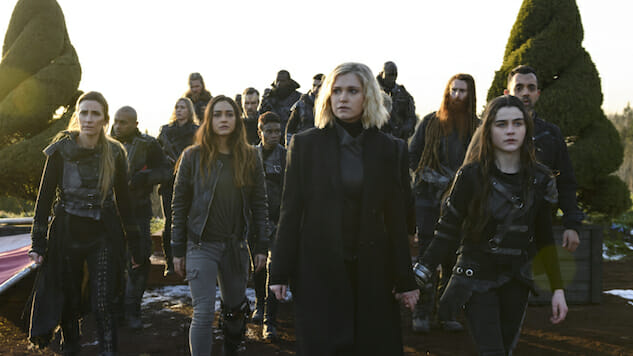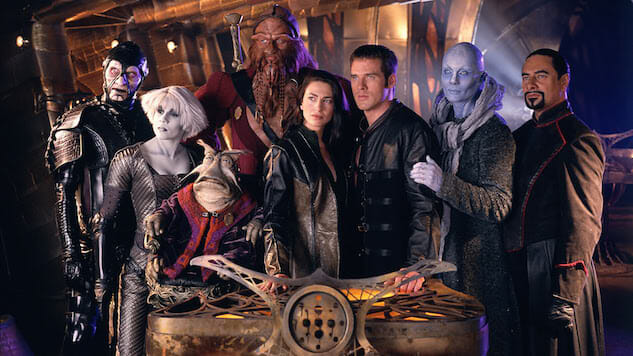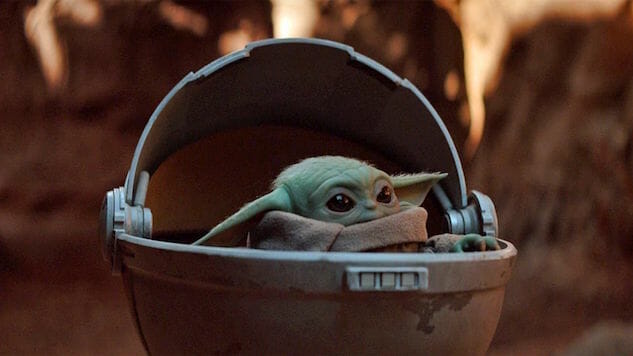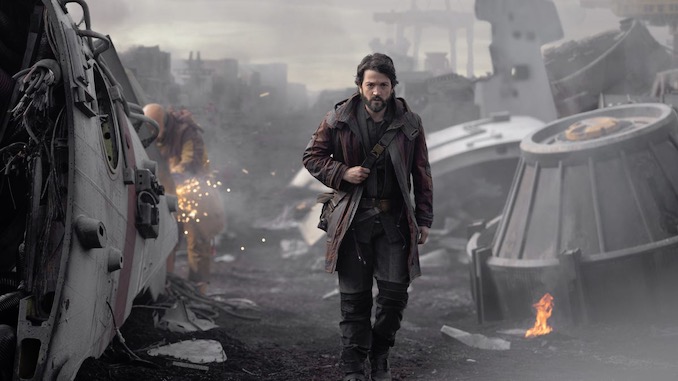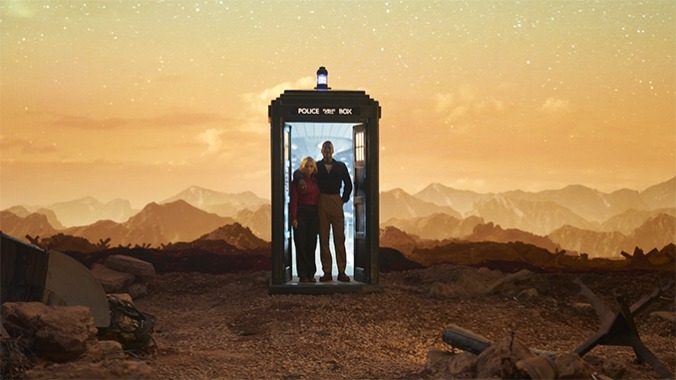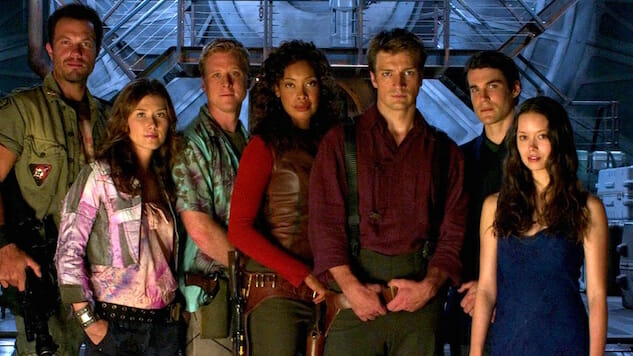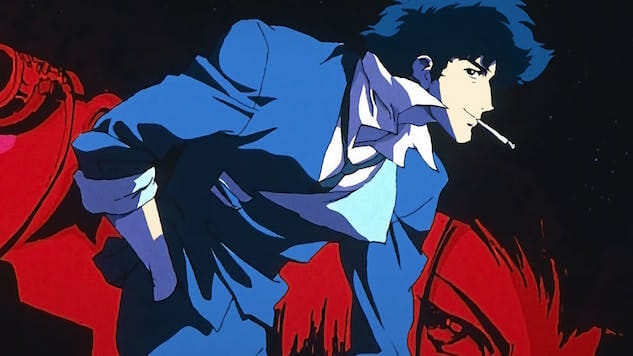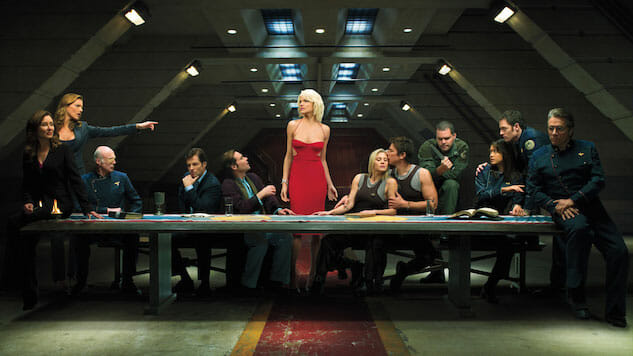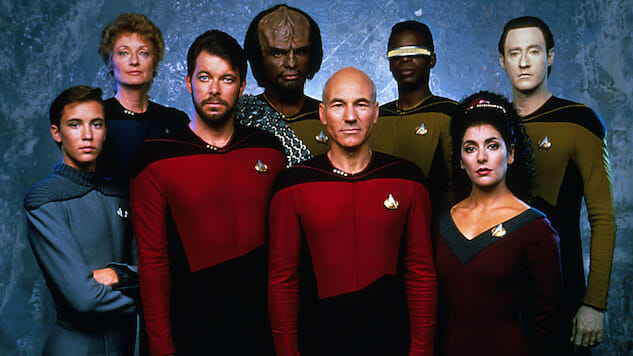17 Best Space-Based TV Series Streaming Right Now
Photo Courtesy of Disney+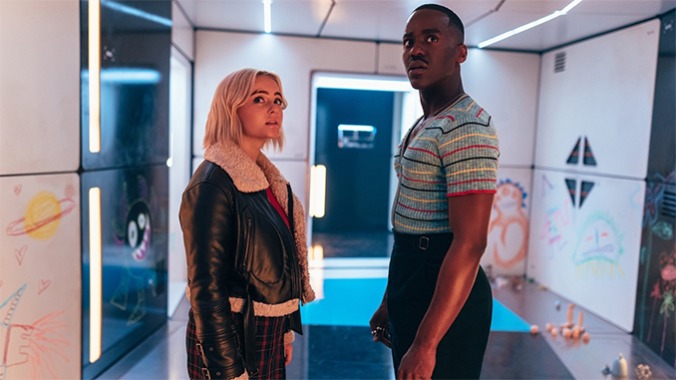
In trying times, it’s not uncommon to wish we could find a way to hit a major reset button and start fresh. Enter sci-fi, the TV genre that simultaneously gives us escapism from the present and anxiety about the future. From classics like the original 1966 Star Trek (and every subsequent spinoff thereafter) to more recent shows like The 100 (aka teen drama meets post-apocalyptic reality series), there are no shortage of takes on what possibilities the not-too-distant future might hold for us.
It’s fitting, then, that so many sci-fi series take place in outer space, the vast and unknown frontier that the rich are elbowing one another to dominate. But these days, space-based series are moving well beyond the realm of pointy ears and little green men; in Netflix’s original series Away, the future is now, and being a space traveler is a job in the same way that being a consultant is a job: it necessitates a lot of time away from family, and long hours spent up in the air.
Here, we’ve rounded up some of the best space-based TV series from the last few decades. From cartoon classics to cult favorites (Doctor Who, anyone?), here are the shows to binge when you’re ready to throw the towel in on planet Earth and go deep-diving into the dark unknown instead.
![]()
17. Dark Matter
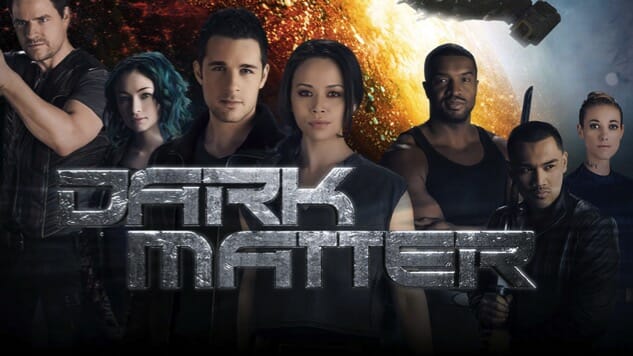
Created by: Joseph Mallozzi, Paul Mullie
Stars: Melissa O’Neil, Anthony Lemke, Alex Mallari Jr., Jodelle Ferland, Roger Cross, Zoie Palmer, Marc Bendavid
Original Network: Syfy (U.S.), Space (Canada)
Based on the Dark Horse Comics series of the same name, Dark Matter kicks off as six people wake up on a spaceship with no memories of who they are or how they ended up there. What follows are three seasons of adventures that gradually ratchet up the stakes while still focusing on glorious character development. Because when you don’t know whether you’re a hero or a villain, you have to redefine your identity. Dark Matter also boasts three kickass female protagonists, including one of the most endearing Androids on television. So it was disheartening when Syfy made the shortsighted decision to cancel the show. We need more three-dimensional leading ladies interacting on our screens, and Dark Matter has them in spades. Luckily, you can still binge every season on Netflix. —Frannie Jackson
16. Foundation
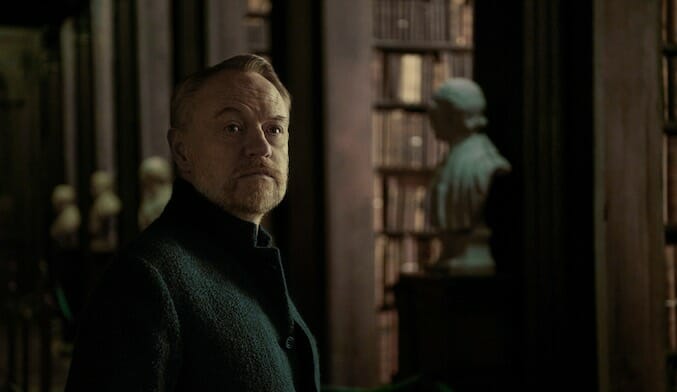
Created by: David S. Goyer and Josh Friedman
Stars: Lee Pace, Jared Harris, Lou Llobell, Leah Harvey, Laura Birn, Terrence Mann, Cassian Bilton, Alexander Siddig, Troy Kotsur
Original Network: Apple TV+
As the long-awaited adaptation of Isaac Asmiov’s iconic series, Foundation takes on massive responsibilities: respect the expansive and iconic source material; impress longtime fans of novels; and somehow take an epic series and condense it into digestible television. Published first as a collection of short stories before eventually growing into a seven-book series, Foundation is as sprawling as the vast universe it explores. As with many science fiction tales, Foundation centers on hope and humanity’s ceaseless fight to survive. Faced with a mathematically proven demise, believers are trying anything they can to ensure the success of future generations. With vibrant costuming and stunning visual effects, it is a gorgeous and entrancing series. Following multiple timelines and taking place on various planets and spaceships, each of the many settings is impeccably designed. —Kristen Reid
15. Star Trek: The Original Series
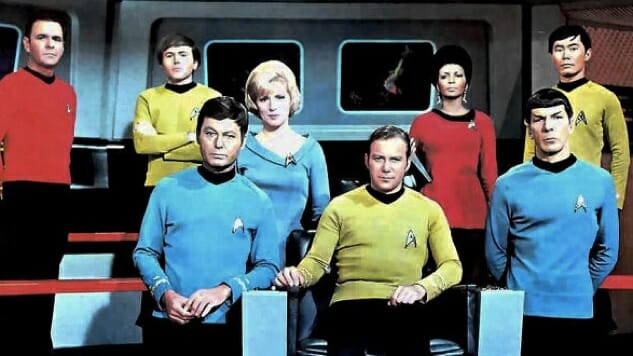
Created by: Gene Roddenberry
Stars: William Shatner, Leonard Nimoy, DeForest Kelley, James Doohan, Nichelle Nichols, George Takei, Walter Koenig
Original Network: NBC
What began as a pitch by writer and producer Gene Roddenberry about a small spaceship exploring the galaxy has since grown into a worldwide cultural phenomenon inspiring millions of viewers (as well as astronauts, scientists and inventors) for more than half a century. A multi-billion dollar franchise spanning TV series, films, books, comics, magazines and videogames—that all starts here.
Four pinging notes ring out in the silence of space. The voice of Captain James T. Kirk (William Shatner) suddenly echoes out among the stars, explaining his crew’s five-year mission via voiceover narration. Their vessel is the Starship Enterprise, which appears in all its glory, orbiting planets and traveling at high warp, faster than anything that 1960s audiences had ever seen, as fast as progress itself. An alien operatic soprano suddenly wails out, then the theme song by composer Alexander Courage, then the titles: STAR TREK. Everything about this new science fiction TV show would break the mold, from its diverse cast and thought-provoking plots to its art direction. At the end of Season 2, when word had spread that Star Trek was at risk of cancellation, NBC received hundreds of thousands of letter in protest from fans, including doctors, professors and even New York Governor Nelson Rockefeller. The Original Series would be canceled in 1969, the last episode airing fewer than two months before Apollo 11’s successful manned mission to the Moon. But its effect was permanent and immeasurable. Roddenberry had built a series that dared to face the unknown, overcome impossible challenges and stretch social conventions for the better. His dream of the future set the stage for a show that would boldly go where no other TV series had gone before. —James Charisma
14. The Expanse
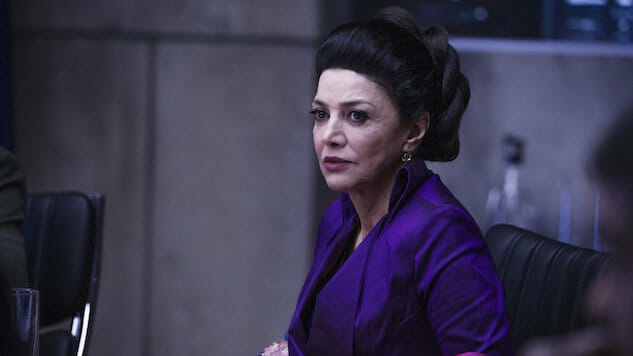
Created by: Mark Fergus and Hawk Ostby
Stars: Thomas Jane, Steven Strait, Shohreh Aghdashloo, Paulo Costanzo
Original Network: Syfy / Amazon
In Syfy’s The Expanse, Mars and Earth are two superpowers racing to gain the technological upper hand, while those who live in the Asteroid Belt mine resources for the more privileged planets and become more and more prone to radicalization. Sound familiar? In its relationship to our own age of authoritarianism, the series offers a kind of storytelling that seems essential: It manages to paint a portrait of a divided universe without vilifying one group and raising the other to god-like status, as evidenced by the complexities of hardboiled detective Joe Miller (Thomas Jane) or U.N. official Chrisjen Avasarala (Shohreh Aghdashloo). The Expanse shows us a possible future, a time in which women can be leaders without the bat of an eye, in which racially diverse groups can unite in common cause. But it is also a warning about keeping institutions in check, about recognizing inequality wherever it might exist, in order to avoid past mistakes. In other words, it’s must-watch television for our time. —Elena Zhang
13. Red Dwarf
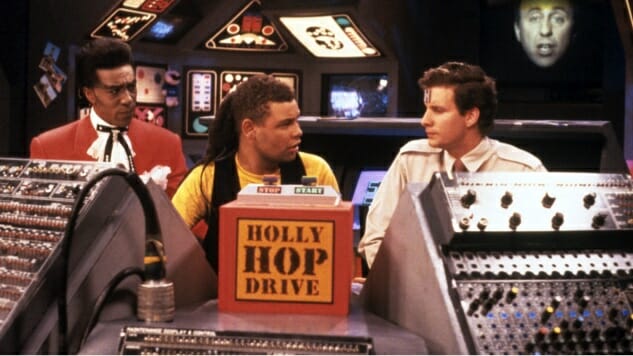
Created by: Rob Grant, Doug Naylor
Stars: Craig Charles, Chris Barrie, Danny John-Jules, Robert Llewellyn, Chloë Annett, Norman Lovett, Hattie Hayridge
Original Network: BBC Two
Watch on Amazon Prime via Britbox
The British have a unique way of turning the end of the human race into a laugh. And like The Hitchhiker’s Guide to the Galaxy, Red Dwarf sees the human race reduced to a population of one with hilarious results. More of a riff on the Odd Couple than is typical of spaceship crews, Dave Lister wakes up three-million years after the rest of the Red Dwarf’s crew are killed by a radiation leak only to find himself alone in a titanic mining ship except for a hologram, a cat and a robot. Lister and his inhuman companions navigate too many twists and turns on their way back to Earth (or to get his girlfriend, whichever happens first) to recount here, but at least the working-class Liverpudlian gets his long-sought chicken vindaloo. The beloved series lasted five years before its first hiatus, and has been revived three times since. —Ellie Decker & JD Jordan
12. Lost in Space
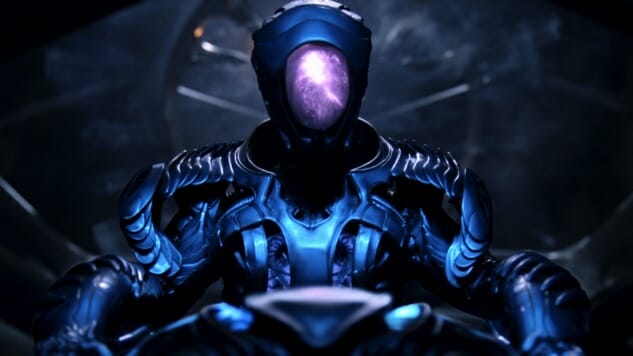
Created by: Irwin Allen
Stars: Molly Parker, Toby Stephens, Maxwell Jenkins, Taylor Russell, Mina Sundwall, Ignacio Serricchio, Parker Posey
Original Network: Netflix
Lost in Space’s Molly Parker and Parker Posey generate much the same excitement as the series’ (many, mostly effective) action sequences. Its motor isn’t the force of the soldier, as represented by Toby Stephens’ gruff John Robinson, but the logic of the scientist (Parker), the guile of the con woman (Posey), the problem-solving acumen of Will (Maxwell Jenkins) and his older sisters, Penny (Mina Sundwall) and Judy (Taylor Russell). From using magnesium to melt ice and commandeering a “chariot”—a cross between a Jeep and a tank—to determining the cause of engine distress, the Robinsons are at their best untangling dilemmas, rather than blasting through them. At one point, facing a more complicated calculation than she expected, Maureen quips, “I’m gonna need a bigger whiteboard,” and it resounds as Lost in Space’s central proposition: That there is room in the genre, and on television, for the “science” in science fiction to be more than the expression of humankind’s worst instincts. In fact, though it’s been (not unreasonably) described as “darker” than Irwin Allen’s original, which aired on CBS from 1965 to 1968, the most important changes in Netflix’s remake—Parker’s top billing, Posey’s casting—reflect more depth than darkness, at least not darkness for its own sake. The series premiere aside, Maureen is John’s equal, if not, at times, the dominant figure in their relationship, one that turns out to be much thornier than it might seem. —Matt Brennan
11. For All Mankind
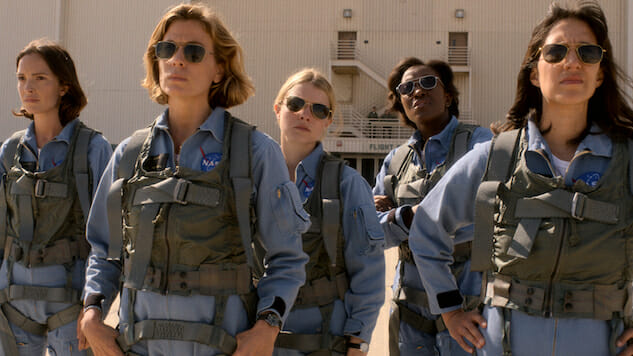
Created by: Ronald D. Moore, Matt Wolpert, Ben Nedivi
Stars:: Joel Kinnaman, Michael Dorman, Wrenn Schmidt, Sarah Jones, Shantel VanSanten, Jodi Balfour
Original Network: Apple TV+
America has never lost gracefully. Exploring alternate histories where America loses usually involves the country’s moral stance defeated by a great political evil. The Nazis win World War 2; the British suppress the revolution. But what if the loss was more complicated than that? More ideologically gray. Less focused on Superman’s truth and justice, and more on his American Way. Apple TV+ asks this question with alt-history For All Mankind’s opening, in which the Soviet Union stuns a watching world by beating the U.S. to the moon, and answers it with an enthralling drama dedicated to the flawed pursuit of greatness.
It’s certainly appropriate for a show about the best pilots in the world to have a great pilot episode, but its early success is matched by a show where politics and science branch in ways pleasing for space junkies and astro-nots alike. The sprawling sociopolitical butterfly effects—like how the Nixon administration reacts to, and is affected by, losing the first leg of the space race—are just one of the pleasures to be found in Ronald D. Moore, Matt Wolpert, and Ben Nedivi’s creation.
NASA, pushed as much by a president needing a political victory as by their own wounded pride, shoots for sci-fi. And the writing is smart. Potentially saccharine rah-rah patriotism is undermined by dashed hopes and a permeating need for American exceptionalism that is, in this version of events, proven untrue. Instead, the series works towards a new national culture in its large scale and quiet, workhorse dignities in its small scale. America gets back to its scrappy roots through its space program.
Those scrappy (bordering on irresponsible) elements—government employees doing their best at the behest of their overlords—see a powerhouse turn underdog. Nothing’s more humanizing than trying to break ground with equipment from the lowest bidder. Avoiding the truly sappy by showing the scars left by the program (the fuck-ups, the deaths, the near-misses, the battered relationships) earns the show its most moving moments. Rather than pure golden glow, For All Mankind leaves you smiling and ugly crying at the same time, amazed that humanity has achieved so much despite all its stupid pettiness. Unlike the space program it follows, For All Mankind pursues greatness, succeeds, and plants an Apple flag for the world to see. —Jacob Oller
10. The Jetsons
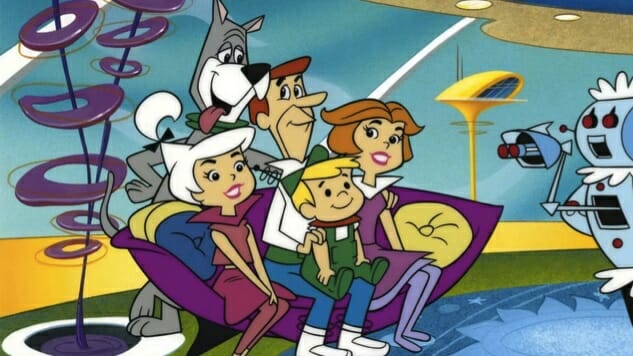
Created by: William Hanna, Joseph Barbera
Stars:: George O’Hanlon, Penny Singleton, Janet Waldo, Daws Butler, Mel Blanc, Don Messick, Jean Vander Pyl, Howard Morris
Original Network: ABC
Meet George Jetson! Zipping through the clouds of Orbit City in his flying saucer, he’s off to work in the morning with his family. He drops off his son, Elroy, at elementary school, his teenage daughter, Judy, at high school, and his wife, Jane, at the mall. He arrives on a moving sidewalk for his job at a sprocket company, where he simply has to press buttons. This is the future of The Jetsons, the Space Age equivalent of The Flintstones, where everyone lives in elevated Space Needle-type platforms high above the Earth and technology isn’t just commonplace, it’s a way of life. As with The Flintstones, the setting is less the subject of social commentary than a backdrop for the show’s sitcom format and an excuse for period-themed jokes and gags. Much of the technology we use regularly today didn’t exist when The Jetsons was produced, including cell phones, personal computers and the Internet. But in today’s world, when everyone’s got their nose in a laptop or iPhone, it’s nice not to see everyone in The Jetsons’ version of the future doing the same. For all the perks of the 21st century, we might still have some growing up to do. —James Charisma
-

-

-

-

-

-

-

-

-

-

-

-

-

-

-

-

-

-

-

-

-

-

-

-

-

-

-

-

-

-

-

-

-

-

-

-

-

-

-

-

